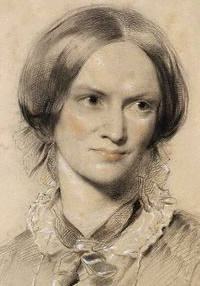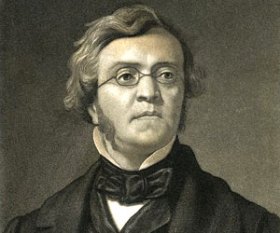Charlotte Bronte’s tremendous admiration for William Makepeace Thackeray is well known. Not only did she express reverence for his work and belief in his abilities in biblical terms in her famous preface to the second edition of ‘Jane Eyre’, (1) but her personal correspondence is replete with praise of, and commentary on his novels. I liked Thackeray’s ‘Vanity Fair’ but the zealousness and intensity of Bronte’s praise for Thackeray has always puzzled me a little. Several reasons underpin this slight perplexity at Charlotte’s almost boundless regard for the author of ‘Vanity Fair’.
There are radical discrepancies between the two authors in their conception and delineation of female characters; Bronte being far more naturalistic and egalitarian than her contemporary in this respect. Thackeray’s ideal women were not exactly simplistic but were heavily sentimentalised: ‘Amelia’ of ‘Vanity Fair’ is a loving, soft-hearted, doting wife and mother (she, in significant respects, embodies Victorian ideals of womanhood). She is also weak, undiscerning, and possesses no real notion of selfhood independent of her status as wife and mother. Amelia is wholly unintellectual. Thackeray decidedly disliked intellectual women, and while ‘Amelia’ is subjected to significant criticism in the novel, there is no denying that Thackeray was simultaneously drawn to, and in a large part upheld, the model of womanhood she represented.
Thackeray repeatedly sought to distinguish himself from Dickens by his emphasis on ‘realism’: resistance to drawing caricatures and eschewal of too many improbable plot contrivances. (2) There are important thematic differences between the authors as well. Though Thackeray partially idealises Amelia, ‘Vanity Fair’ exposes the tyranny weak people like her can also exert, their capacity for selfishness and their desire for domination. In a work of Dickens, it is probable that a character like Amelia would have been uncritically extolled until the final chapter. However, stylistically, Dickens and Thackeray are much closer than is often acknowledged. For all the ‘Greek fire of his sarcasm’,(3) gushing sentimentality is as much a fixture in Thackeray’s work as it is in Dickens. Indeed, in the case of the former, the narratorial voice not infrequently becomes tinged with smugness. Lest I be misunderstood I do think that both Dickens and Thackeray were genuinely great authors, but aspects of their writing and characterisation do ruffle me. Their heroines, be it ‘Amelia Sedley’ of ‘Vanity Fair’ or ‘Florence Dombey’ of ‘Dombey and Son’ are a far cry from the ‘Jane Eyre’s’ or ‘Lucy Snow’s’ of Bronte’s novels. Bronte’s work is marked by a naturalism that is not measured up to by either Dickens or Thackeray. She exhibits the interior lives, and interesting and expanded minds of her heroines with a skill, eloquence, and power which is matched by few, if any, of her contemporaries. Bronte’s heroines were highly intelligent, intellectual women (indeed, how could they be otherwise when they often constituted varied versions of Charlotte herself at different stages of her life). As Jane observes as she wanders about the halls and grounds of Thornfield:
“It is in vain to say human beings ought to be satisfied with tranquillity: they must have action; and they will make it if they cannot find it. Millions are condemned to a stiller doom than mine, and millions are in silent revolt against their lot. Nobody knows how many rebellions besides political rebellions ferment in the masses of life which people earth. Women are supposed to be very calm generally: but women feel just as men feel; they need exercise for their faculties, and a field for their efforts, as much as their brothers do; they suffer from too rigid a restraint, too absolute a stagnation, precisely as men would suffer; and it is narrow-minded in their more privileged fellow-creatures to say that they ought to confine themselves to making puddings and knitting stockings, to playing on the piano and embroidering bags. It is thoughtless to condemn them, or laugh at them, if they seek to do more or learn more than custom has pronounced necessary for their sex.” (4)
In Charlotte Bronte’s novel ‘Shirley’, Shirley (a heroine Charlotte modelled on her sister Emily) Shirley remarks to Caroline:
“If men could see us as we really are, they would be a little amazed; but the cleverest, the acutest men are often under an illusion about women. They do not read them in a true light; they misapprehend them, both for good and evil. Their good woman is a queer thing, half doll, half angel; their bad woman almost always a fiend. Then to hear them fall into ecstasies with each other’s creations—worshipping the heroine of such a poem, novel, drama—thinking it fine, divine! Fine and divine it may be, but often quite artificial—false as the rose in my best bonnet there. If I spoke all I think on this point, if I gave my real opinion of some first-rate female characters in first-rate works, where should I be? Dead under a cairn of avenging stones in half an hour.’” (5)
It can safely be assumed that Charlotte Bronte here is giving expression to her own objections regarding the way women have been characterised by her eminent male contemporaries. Indeed the ‘half-doll, half-angel’ woman and ‘fiend’ at the other end of the spectrum sound remarkably like ‘Amelia Sedley’ and ‘Becky Sharp’ of ‘Vanity Fair’. I actually think that despite Thackeray’s emphasis on ‘realism’ Becky at times appears to be something of a caricature herself. Even amongst the passages of extensive praise for Thackeray, Charlotte did occasionally voice these objections. She, however, never really expands on this theme. In an 1852 letter to George Smith she writes:
“As usual, he is unjust to women; quite unjust. There is hardly any punishment he does not deserve for making Lady Castlewood peep through a keyhole, listen at a door, and be jealous of a boy and a milkmaid. Many other things I noticed that, for my part, grieved and exasperated me as I read; but then, again, came passages so true, so deeply thought, so tenderly felt, one could not help forgiving and admiring.”(6)
While Bronte had almost unabated enthusiasm for Thackeray’s writing and faith in his calling as the ‘first social regenerator of the day’, Thackeray’s own opinion of Charlotte Bronte and her novels was far more mixed. He was considerably moved by ‘Jane Eyre’ and recognised the genius of the woman who had penned it,(7) but their personal interactions were marked by an uneasiness and perhaps mutual misunderstanding. (8) George Smith, the publisher and close friend of both Charlotte Bronte and William Makepeace Thackeray offers the following significant insight:
“Thackeray’s wit was not a ready one and he had not the quickness necessary for repartee. A clever woman always, and easily, had the better of him in that respect, and, to tell the truth, Thackeray was not fond of the society of what are called “clever women”; women, that is, whom he felt to be critical and with whom talk involved any mental strain. For that reason he did not like Charlotte Bronte, and the two did not get on well together. She was vexed because he, in his talk with her, would never be serious about his literature. He would talk in a bantering and burlesque way, as though he were ashamed of it. But this was only by way of defence against Charlotte Bronte’s earnest and heroic views of the “sacredness” and “dignity” of literature.”(9)
On pursuing ‘Villette’ Thackeray stated “There’s a fire and fury raging in that little woman, a rage scorching her heart which doesn’t suit me.” (10) His condescending and supercilious extended comments on the novel are contained within an 1853 letter directed to Lucy Baxter:
“So you are all reading Villette to one another- a pretty amusement to be sure- I wish I was hearing you and smoking of a cigar the while…. And it amuses me to read the author’s naïve confession of being in love with two men at the same time; and her readiness to fall in love at anytime. The poor little woman of genius! The fiery little eager brave tremulous homely-faced creature! I can read a great deal of her life as I fancy in her book, and see that rather than have fame, rather than any other earthly good…she wants some Tomkins or another to love her and be in love with. But you see she is a little bit of a creature without a penny of good looks, thirty years old I should think, buried in the country and eating her own heart up there, and no Tomkins will come…here is one a genius, a noble heart longing to mate itself and destined to wither away into old maidenhood with no chance to fulfil the burning desire.” (11)
I understand Charlotte Bronte’s regard for William Makepeace Thackeray to a significant extent. I do think he was a fine writer, even if his prose did (not infrequently) lapse into sentimental gush, and even if his female characters were at times poorly conceived. There are numerous passages of ‘Vanity Fair’ which I genuinely admire (most notably the confrontation scene between Dobbins and Amelia near the end of the novel). But I don’t think that the flaws identified above are insignificant, and accordingly I find it somewhat puzzling that Charlotte Bronte hero-worshiped him to the extent that she did. ©
(1) Charlotte Bronte, Jane Eyre (Essex: Longman, 1991) xxvi-xxvii
(2) Charles Mauskopf, “Thackeray’s attitudes towards Dickens’ writing” Nineteenth-Century Fiction 21 (1966): 21-33
(3) Bronte, Jane Eyre, xxvi
(4) Ibid, 113
(5) Charlotte Bronte, Shirley, (Hertfordshire: Wordsworth Editions Limited, 1993): 264
(6) Elizabeth Gaskell, The Life of Charlotte Bronte, (London: Smith, Elder and Co, 1857)
(7) Richard Mullen, “Charlotte Bronte and William Makepeace Thackeray” Bronte Studies 36 (2011): 85-94
(8) Ibid
(9) Charlotte Bronte, “The Letters of Charlotte Bronte: With a Selection of Letters by Family and Friends: Volume II: 1848-1851”, Margaret Smith ed. (New York: Oxford University Press, 2000): 416
(10) Mullen, “Charlotte Bronte and William Makepeace Thackeray”, 92
(11) William Makepeace Thackeray, The Letters and Private Papers of William Makepeace Thackeray, Gordon N. Ray ed. (London: Oxford University Press, 1945-46)


Jun 24, 2014 @ 14:26:34
She worshipped him before she met him -she complimented him several times afterwards but was probably embarassed by her gushing early praise. And indeed when they met she criticized him sharply, listed all his faults and later did not speak of him in the same exalted tones.